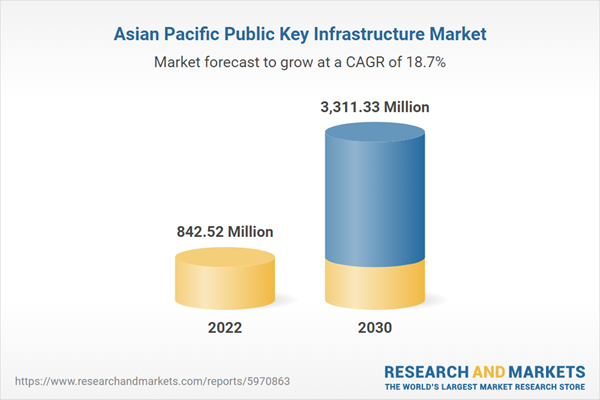Blockchain Integration Fuels Asia Pacific Public Key Infrastructure Market
Blockchain integration presents a compelling opportunity to the PKI market by enhancing the security and functionality of decentralized systems. PKI provides a robust framework for managing digital identities, authenticating users, and securing communications - essential components for blockchain networks. As blockchain relies on cryptographic keys for identity verification and transaction integrity, PKIs expertise in key management seamlessly aligns with blockchains requirements. The combination ensures the trustworthiness of digital transactions, mitigates the risk of unauthorized access, and safeguards the integrity of data within the blockchain. This synergy between PKI and blockchain is crucial for fostering trust in decentralized ecosystems, making PKI a key enabler for blockchain-based applications ranging from financial transactions to supply chain management. As blockchain continues to permeate various industries, the demand for PKI solutions to fortify the security infrastructure of decentralized networks is a significant avenue for the PKI market.Asia Pacific Public Key Infrastructure Market Overview
The APAC public key infrastructure market is segmented into Australia, China, India, Japan, South Korea, and the Rest of APAC. In the last few years, the threat of cyber-attacks in Asia Pacific has increased. This is due to swiftly increasing connectivity and the pace of digital transformation in the region, further resulting in improving concern for technological threats among the companies. The growing threat of cybercrimes in Asia Pacific is also majorly because of the lack of transparency, resulting in weak cyber enforcement and regulations by government authorities. Less awareness and investments in the security industry also contribute to the factors hindering the public key infrastructure market in the region. In Asia Pacific, the adoption of IoT is on the rise, as various market players in the region are taking multiple initiatives for the deployment of IoT. For instance, in July 2021, CollaboGate Japan (CG) announced its business alliance with Tessera Technology (TSSR) to develop a decentralized IoT platform. This platform will use robust hardware-based security functionality of the Renesas microcontroller units (MCUs), which can help verify contactless transactions conducted through IoT devices. Similarly, in January 2023, South Koreas Ministry of Oceans and Fisheries (MOF) announced the installation of IoT on containers to enhance export competitiveness. The technology will help track the location and status of containers, and in the case of reefers, it will help monitor temperatures. Thus, the growing deployment of IoT in various APAC countries is raising the demand for security solutions to protect the data. Further, to avoid Distributed Denial-of-Service (DDoS) attacks that might bring down operations in significant industry verticals such as BFSI and IT & telecom, the demand for public key infrastructure technology is rising in the region.Asia Pacific is observing strong growth in the market as the region consists of a huge population with internet access and a rise in awareness among government organizations about cyber threats and crimes. In addition, the IT & telecom sector is also booming in various countries of APAC, such as India, China, and Japan. Organizations related to IT & Telecom, BFSI, and other end-user industries deal with a vast customer base and user data. Therefore, to ensure the privacy of data during a transaction, various organizations are adopting public key infrastructure solutions that are supporting the growth of public key infrastructure market in Asia Pacific.
Asia Pacific Public Key Infrastructure Market Segmentation
The Asia Pacific public key infrastructure market is segmented into component, deployment, enterprise size, end user, and country.Based on component, the Asia Pacific public key infrastructure market is segmented into solutions and services. The solutions segment held a larger share of the Asia Pacific public key infrastructure market in 2022. The services segment is further sub segmented into professional services and managed services.
Based on deployment, the Asia Pacific public key infrastructure market is segmented into on-premise and cloud. The on-premise segment held a larger share of the Asia Pacific public key infrastructure market in 2022.
Based on enterprise size, the Asia Pacific public key infrastructure market is segmented into SMEs and large enterprises. The large enterprises segment held a larger share of the Asia Pacific public key infrastructure market in 2022.
Based on end user, the Asia Pacific public key infrastructure market is segmented into BFSI, retail & e-commerce, government & defense, IT & telecom, manufacturing & automotive, and others. The BFSI segment held the largest share of the Asia Pacific public key infrastructure market in 2022.
Based on country, the Asia Pacific public key infrastructure market is segmented into Australia, China, India, Japan, South Korea, and the Rest of Asia Pacific. China dominated the Asia Pacific public key infrastructure market in 2022.
Digicert Inc., eMudhra Limited, Entrust Corp, Fortinet Inc., GMO GlobalSign Ltd, Sectigo Ltd, Securemetric Berhad, and Thales SA are some of the leading companies operating in the Asia Pacific public key infrastructure market.
Table of Contents
Companies Mentioned
- Digicert Inc.
- eMudhra Limited
- Entrust Corp
- Fortinet Inc.
- GMO GlobalSign Ltd
- Sectigo Ltd
- Securemetric Berhad
- Thales SA
Table Information
| Report Attribute | Details |
|---|---|
| No. of Pages | 95 |
| Published | March 2024 |
| Forecast Period | 2022 - 2030 |
| Estimated Market Value in 2022 | 842.52 Million |
| Forecasted Market Value by 2030 | 3311.33 Million |
| Compound Annual Growth Rate | 18.7% |
| Regions Covered | Asia Pacific |
| No. of Companies Mentioned | 8 |









